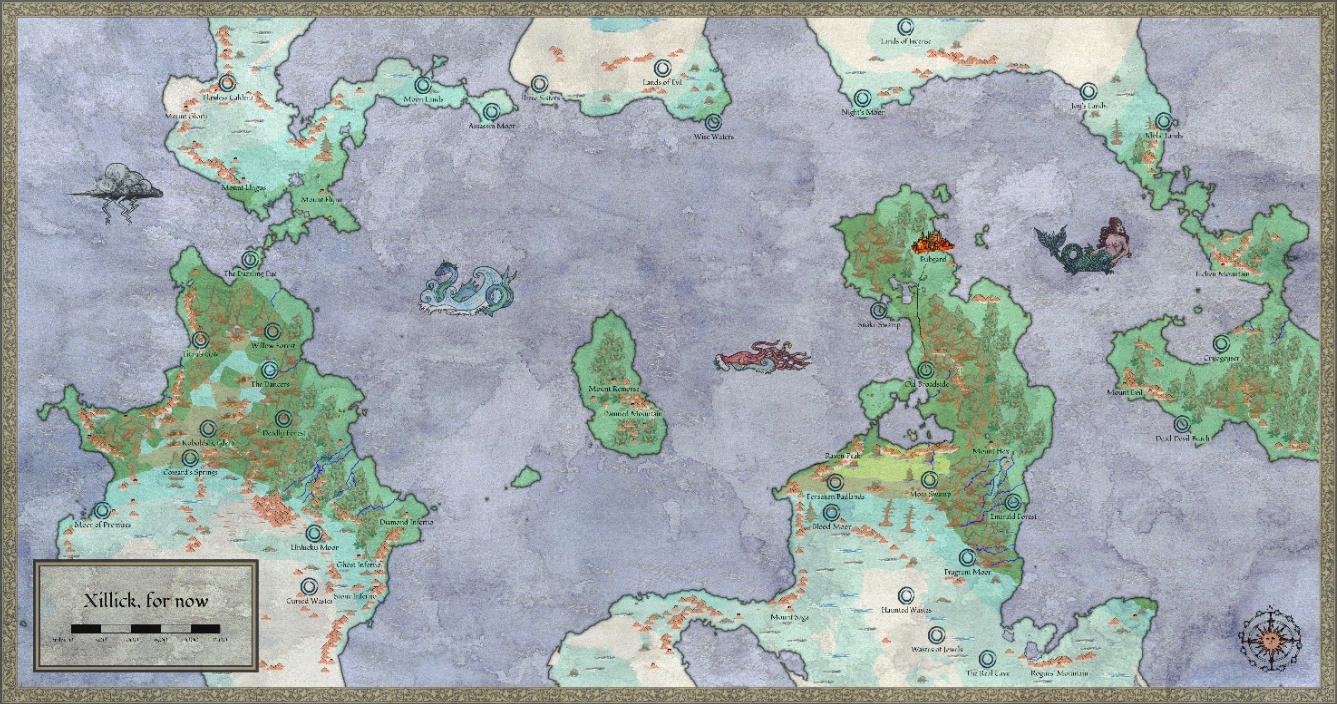Flurd
Almost everyone's favourite animal in Xillick.
Funny, cute, and incredibly stupid, the flurd bobs along with little apparent direction or aim - until direction is made evident by the repeated crashing into a tree or other obstacle.
It is theoretically possible to keep a flurd as a pet, but widely frowned upon, as they are considered "wild," and thus thought to require a large amount of freedom. Conversely, and confusingly, if a flurd should choose your company, you will be considered a good person by most folk. They believe flurds have a superior understanding of good, safe people.
Basic Information
Anatomy
A bright, vivid blue, green, yellow, or orange, with varying accents, the Flurd is a sort of strange, round bird with a mostly pufferfish-like appearance, a small, yellow, triangular beak, gentle, flowing, tapering whiskers, almost beardlike, and slightly bulging, fishlike eyes. They float thanks to gallbladders filled with helium, filtered out of the atmosphere.
Biological Traits
The skin - or feathers - or whatever the outside layer of a flurd is - has a strangely rubbery feel and consistency, slightly squishy. Flurds are very tender and fragile, though, so squishing is not advised.
Genetics and Reproduction
Gestation period is a few weeks, though reproduction is not frequently occuring, typically only about three pregnancies, or "litters" per lifespan. Flurds are not very intuitive or gifted parents, though they try their best. Being essentially hermaphroditic, they do not particularly require a partner in order to reproduce, though they have been known to "fall in love" (though whether this is anthropomorphosis, or transference, on the part of humanoids, is anyone's guess) and mate for life.
Growth Rate & Stages
Flurds grow fairly quickly, reaching adulthood at a little under a year. Their infancy typically lasts about five weeks, with pre-adolescent development lasting two to three months, and awkward adolescence making up the rest of their developmental phase. Aging is not typically overtly noticeable to outside observers, though it is characterised, externally, mostly by a dulling of their colouring, and a greying and thinning of the whiskers.
Ecology and Habitats
Flurds thrive in and vastly prefer a more temperate climate, though moderate numbers of the bird can be found in other biomes, such as the Emerald Woods, the surrounds of Roseacre, or the Blessed Coast.
Dietary Needs and Habits
Typically they eat insects, bugs and berries. They have been known to drink nectar and sap, on occasion.
Biological Cycle
Lifespan is typically just ten years. Some die at two from natural causes, others at fifteen. They are considered prey by a few, uncommon natural predators, and some savage tribes have been known to cook and eat them. Some flurds do not survive the first six weeks of life, as a direct result of climate or predators.
Additional Information
Geographic Origin and Distribution
Most commonly found in more temperate climates, though capable of surviving, and found commonly enough, in other biomes as well.
Average Intelligence
Low.
Perception and Sensory Capabilities
Just regular really. Not great at regular hearing, but good at picking up a wider range of frequencies than humans. Eyes are bulgy like a fish, which can make depth perception a bit difficult at times. Many of Xillick's denizens find the sight of a Flurd flying repeatedly into a tree that it can't see to be hilariously funny.
Scientific Name
None
Origin/Ancestry
Unknown
Lifespan
10 years
Conservation Status
Most cultures frown on the killing, hunting, habitat destruction, or anything that may threaten these creatures.
Average Height
15 centimetres, or 6 inches.
Average Weight
3 pounds, or a tad more than a kilogram.
Average Length
The same as height.
Average Physique
Round.
Remove these ads. Join the Worldbuilders Guild









Comments